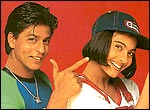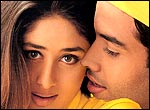
|
I don't know you, but I love you
Deepa Gahlot explores love in Bollywood
|
Deepa Gahlot
In the recently released Na Tum Jaano Na Hum, the character played by Esha Deol tells her grandfather she wants to marry her pen pal --- a man she has never seen. She does not know his occupation, family background or where he stays. She is lucky the man happens to be Hrithik Roshan and not some creep.
Similarly, Hrithik wants to marry a girl he has never met because they like the same things --- the colour blue, the rain and staring at the moon. Enough to plan a life together? Apparently, that's all it takes.
Today, filmmakers are totally out of it when it comes to portraying love. Love at first sight sounds exciting and fun, but nowadays people are more sensible than that.
 In films, notice how the boy and girl do not fall in love because they have met a few times and have common interests. They bump into each other --- literally in most cases --- and after that first glimpse, sing a couple of songs and promptly decide to get married. The fact that they may be in the first year of college and all of 17 doesn't count. Nor does career, money, home, stability, future.
In films, notice how the boy and girl do not fall in love because they have met a few times and have common interests. They bump into each other --- literally in most cases --- and after that first glimpse, sing a couple of songs and promptly decide to get married. The fact that they may be in the first year of college and all of 17 doesn't count. Nor does career, money, home, stability, future.
Even taking into consideration the magic of pehli nazar in matters of romance, our filmmakers are stuck in a timewarp of the 1930s. At the time, girls and boys were strictly segregated, no sexual matters hinted at, leave aside discussed; hormones raging, major confusion about sexuality, repression building --- the only way out was to get fixated on the first man/woman seen. No matter how ugly or brainless.
Now, the age of innocence is long gone. In urban areas, boys and girls play and study together in co-ed schools. Awareness of the opposite sex is high, bombarded with sexual messages in the media. Today's generation demands more out of marriage than their old assigned roles. They want companionship and compatibility, which would be rather hard to come by if people got married to the first person of the opposite sex they laid their eyes on.
 Still, this idiocy persists in our films like Mujhe Kucch Kehna Hai, Koi Mere Dil Se Poochhe, Rehnaa Hai Terre Dil Mein, Na Tum Jaano Na Hum, Aap Mujhe Achche Lagne Lage, Pyar Diwana Hota Hai (note the similar titles), and so many others when a person (usually the guy) falls madly in love without knowing the first thing about the object of his adoration.
Still, this idiocy persists in our films like Mujhe Kucch Kehna Hai, Koi Mere Dil Se Poochhe, Rehnaa Hai Terre Dil Mein, Na Tum Jaano Na Hum, Aap Mujhe Achche Lagne Lage, Pyar Diwana Hota Hai (note the similar titles), and so many others when a person (usually the guy) falls madly in love without knowing the first thing about the object of his adoration.
In Rahul Rawail's Bekhudi, tiIl a large portion of the film was over, the boy and girl were so besotted that they didn't even ask each other's names!
In reality, it is implausible, if not impossible, for a rich girl to fall in love with an uneducated tapori. After they have sung about going to Khandala, what would they talk about? What would they live on? And where?
Still, girls in Raja Hindustani, Dulhe Raja, Albela, Pyar Diwana Hota Hai do just that.
In today's communicative times, it seems possible for a couple to fall in love over the phone or on the net after they have exchanged a list of likes and dislikes --- even letter-writing of the Sirf Tum variety can pass. If looks match intellect, it is an added attraction.
But communication is an important part of a modern relationship. Attraction at first sight is fine for a first date. But what if the boy or girl with the drop-dead looks was an imbecile? How many love-at-first-sight relationships result in marriage?
 That's why the gradual development of love in films like Kuch Kuch Hota Hai and Dil Chahta Hai seem more convincing. Though many of our heroes ought to be dumped for stupidity (Deewanapan, Kya Yehi Pyar Hai, Pyar Diwana Hota Hai) and heroines for dumbness (Rehnaa Hai Terre Dil Mein, Aap Mujhe Achche Lagne Lage, Na Tum Jaano Na Hum).
That's why the gradual development of love in films like Kuch Kuch Hota Hai and Dil Chahta Hai seem more convincing. Though many of our heroes ought to be dumped for stupidity (Deewanapan, Kya Yehi Pyar Hai, Pyar Diwana Hota Hai) and heroines for dumbness (Rehnaa Hai Terre Dil Mein, Aap Mujhe Achche Lagne Lage, Na Tum Jaano Na Hum).
But then what is it they say about filmmakers selling dreams? Unfortunately, these are dreams of men, by men, for men. And men presumably dream of pretty and dumb women, preferably rich too, who worship the ground they walked on.
If dreams were woven for women, filmmakers would have to create handsome, intelligent, articulate, successful, brave, tender and loving men. But that would be too much of an effort for them.
Earlier column
E-mail Deepa Gahlot